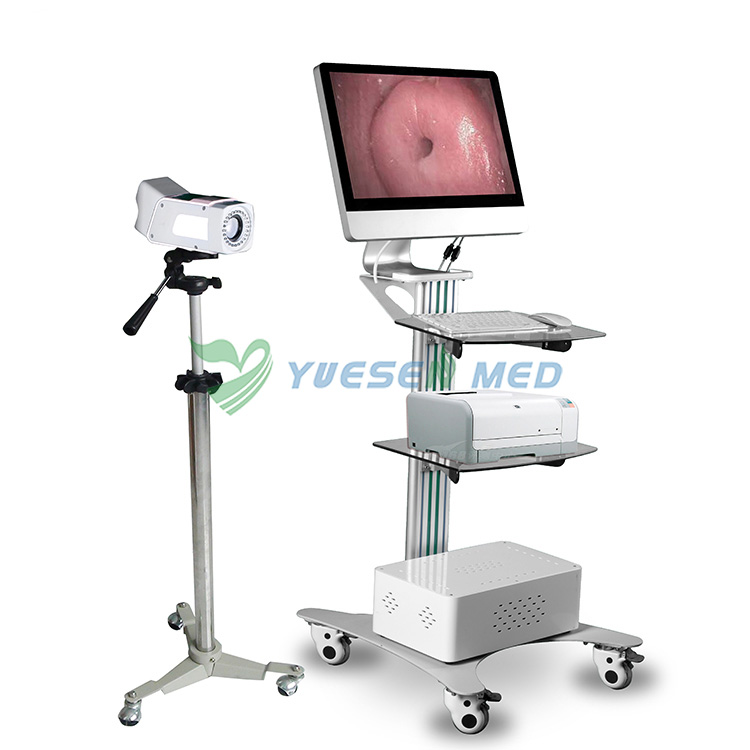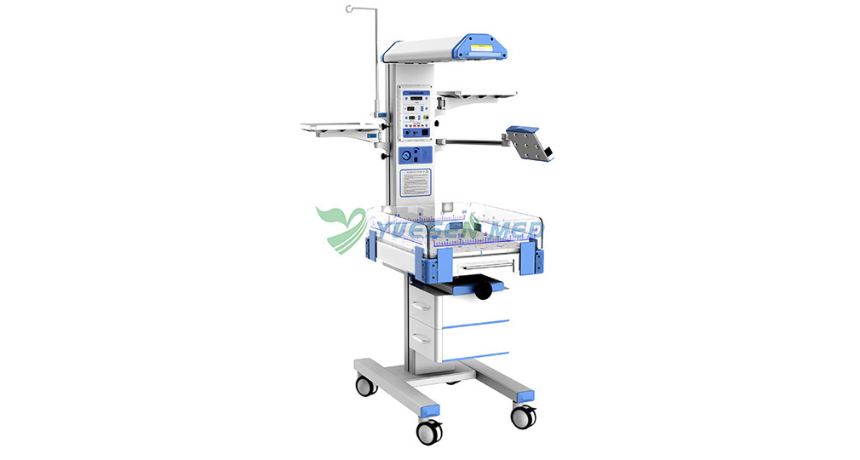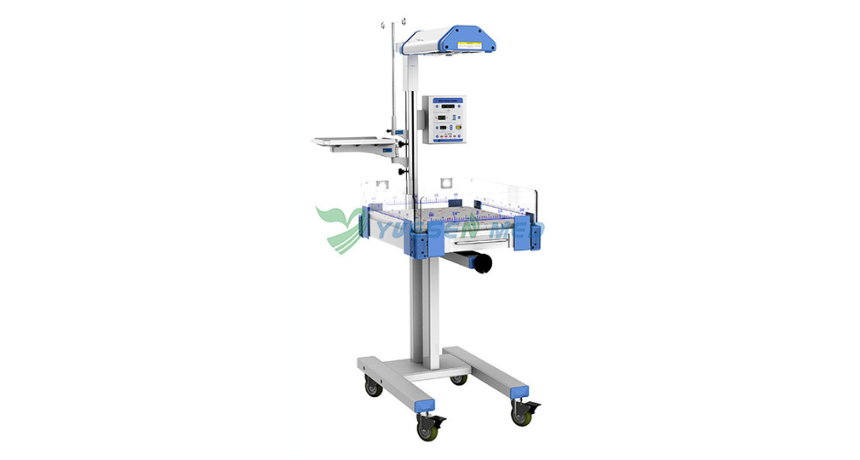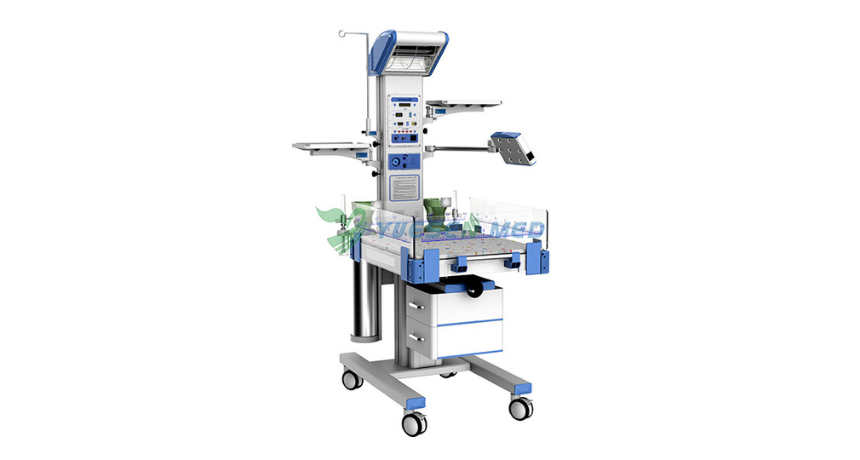Hot Products
YSX500D 50kW DR system set up and put into service in Cambodia.
YSENMED YSX500D 50kW digital x-ray system has been successfully set up and put into service in a hospital in Cambodia.
YSX056-PE serving as a vehicle-mounted x-ray in the Philippines
YSX056-PE 5.6kW portable x-ray unit has been adapted to fit on a truck, to provide mobile x-ray examination service for remote communities in the Philippines.
X Ray Machine To Zimbabwe
x ray machine, 50KW x ray machine
Microscope To Malawi
Achromatic objectives: 4X、10X、40X(S), 100X(S、Oil) Wide field eyepiece: WF10X(WF16X for option) Eyepiece head: Sliding binocular head inclined at 45° Stage: Double layer mechanical stage size 140X140mm, moving range 75X45mm Focusing: Coaxial coarse and
From Analog to Digital: How Optical Colposcopes Are Redefining Gynecological Exams
Views : 746
Update time : 2024-12-20 16:26:00
The world of gynecology is evolving rapidly, and one of the most significant advancements in this field is the transition from analog to digital optical colposcopes. This shift is not just a technological upgrade; it's a game-changer for both healthcare providers and patients. In this article, we'll dive deep into how optical colposcopes are redefining gynecological exams, enhancing patient care, and improving diagnostic accuracy.

What Is a Colposcope?
Before we jump into the digital revolution, let's clarify what a colposcope is. A colposcope is a specialized medical instrument used to examine the cervix, vagina, and vulva. It magnifies the area, allowing healthcare providers to spot abnormalities that may indicate conditions like cervical cancer or other diseases.
The Traditional Analog Colposcope
For many years, colposcopes were purely analog devices. They relied on lenses and mirrors to provide a magnified view of the cervical area. While effective, these devices had limitations, including poor image quality and the inability to capture and store images for later analysis.
The Need for Change
As with many medical technologies, the analog model started showing its age. The need for better accuracy, documentation, and patient comfort became apparent. Providers and patients alike were calling for a more advanced solution.
Enter Digital Optical Colposcopes
Digital optical colposcopes emerged as a solution to the limitations of their analog predecessors. But what exactly makes them so revolutionary? Let's break it down.
Enhanced Image Quality
One of the most significant advantages of digital colposcopes is their superior image quality. High-resolution cameras provide clear, detailed images that allow for more accurate assessments. Imagine trying to read a book in dim light versus bright daylight; the difference in clarity is striking. That's what digital colposcopes do for gynecological exams.
Real-Time Analysis
With digital technology, healthcare providers can analyze images in real time. This means they can make immediate decisions based on what they see, rather than waiting for lab results or further tests. It's like having a GPS that updates your route as you drive—real-time data can lead to quicker and more informed decisions.
Improved Documentation and Record-Keeping
Gone are the days of scribbling notes on paper charts. Digital colposcopes can capture images and store them electronically, creating a comprehensive patient record. This not only streamlines the documentation process but also ensures that all relevant information is easily accessible for future visits.
Enhanced Patient Comfort and Engagement
Let's be honest—gynecological exams can be uncomfortable. Digital colposcopes often come with features designed to enhance patient comfort, such as adjustable lighting and less intrusive designs. Plus, the ability to show patients their images during the exam can help demystify the process and reduce anxiety. Wouldn't you feel more at ease if you could see what the doctor sees?
How Digital Colposcopes Work
The Technology Behind the Magic
Digital colposcopes utilize advanced optics and digital imaging technology. They typically consist of a camera, a light source, and a display monitor. The camera captures high-resolution images, which are then displayed on a monitor for immediate viewing.
Integration with Other Systems
Many digital colposcopes can integrate with electronic health record (EHR) systems. This seamless connection allows for easier data sharing and enhances the overall workflow in a healthcare setting. Imagine a well-oiled machine where every part works together smoothly—that's what integration achieves.
Benefits for Healthcare Providers
Increased Efficiency
Digital colposcopes streamline the examination process, allowing healthcare providers to see more patients in a shorter amount of time. This efficiency is crucial in busy clinics, where every minute counts.
Better Training and Education
Digital images can be used for training new healthcare providers. By reviewing actual cases, trainees can learn to identify abnormalities and improve their diagnostic skills. It's like watching a master chef at work before trying your hand in the kitchen.
Enhanced Collaboration
With high-quality images stored digitally, providers can easily share cases with colleagues for second opinions or consultations. This collaboration can lead to better patient outcomes, as multiple experts weigh in on a diagnosis.
Benefits for Patients
Improved Accuracy and Early Detection
Digital colposcopes enable more accurate examinations, which can lead to earlier detection of potential issues. Early detection is key in treating conditions like cervical cancer, where outcomes are significantly better when caught early. Think of it as catching a small leak in your roof before it turns into a waterfall in your living room.
Empowerment Through Education
When patients can see their images and understand their conditions better, they feel more empowered in their healthcare journey. This transparency fosters trust between patients and providers, encouraging patients to ask questions and engage in their care.
Reduced Anxiety
As mentioned earlier, the ability to visualize what's happening during an exam can help reduce anxiety. Patients are often more relaxed when they understand the process and what to expect. It's like having a friend explain a scary movie plot before watching it—you're less likely to jump at every scare.
Challenges in the Transition
Cost Considerations
Switching from analog to digital colposcopes can be a significant financial investment for healthcare facilities. However, the long-term benefits often outweigh the initial costs. It's a bit like buying a high-quality blender; while it's pricier upfront, the smoothies you make will be worth it!
Training and Adaptation
Healthcare providers need to be trained in using new digital systems. This transition can take time and effort, but the payoff in improved patient care is worth it. After all, every new gadget requires a learning curve, right?
The Future of Gynecological Exams
Continuous Innovation
As technology continues to evolve, we can expect even more advancements in colposcopy. Features like artificial intelligence (AI) could soon assist in diagnosing conditions by analyzing images for patterns that might indicate disease. It's like having a super-smart assistant who never misses a detail.
Telemedicine Integration
The rise of telemedicine has changed how we approach healthcare. Digital colposcopes could play a role in remote consultations, allowing specialists to review images and provide guidance without being physically present. This can be especially beneficial for patients in rural areas.
Conclusion
The transition from analog to digital optical colposcopes is redefining gynecological exams in profound ways. With enhanced image quality, real-time analysis, and improved patient engagement, both healthcare providers and patients stand to gain immensely. While challenges remain, the benefits of digital technology in this field are undeniable. As we move forward, the future of gynecological care looks brighter than ever, paving the way for better health outcomes and more empowered patients. So, the next time you visit your gynecologist, remember that the tools they use are evolving, just like our understanding of women's health.

What Is a Colposcope?
Before we jump into the digital revolution, let's clarify what a colposcope is. A colposcope is a specialized medical instrument used to examine the cervix, vagina, and vulva. It magnifies the area, allowing healthcare providers to spot abnormalities that may indicate conditions like cervical cancer or other diseases.
The Traditional Analog Colposcope
For many years, colposcopes were purely analog devices. They relied on lenses and mirrors to provide a magnified view of the cervical area. While effective, these devices had limitations, including poor image quality and the inability to capture and store images for later analysis.
The Need for Change
As with many medical technologies, the analog model started showing its age. The need for better accuracy, documentation, and patient comfort became apparent. Providers and patients alike were calling for a more advanced solution.
Enter Digital Optical Colposcopes
Digital optical colposcopes emerged as a solution to the limitations of their analog predecessors. But what exactly makes them so revolutionary? Let's break it down.
Enhanced Image Quality
One of the most significant advantages of digital colposcopes is their superior image quality. High-resolution cameras provide clear, detailed images that allow for more accurate assessments. Imagine trying to read a book in dim light versus bright daylight; the difference in clarity is striking. That's what digital colposcopes do for gynecological exams.
Real-Time Analysis
With digital technology, healthcare providers can analyze images in real time. This means they can make immediate decisions based on what they see, rather than waiting for lab results or further tests. It's like having a GPS that updates your route as you drive—real-time data can lead to quicker and more informed decisions.
Improved Documentation and Record-Keeping
Gone are the days of scribbling notes on paper charts. Digital colposcopes can capture images and store them electronically, creating a comprehensive patient record. This not only streamlines the documentation process but also ensures that all relevant information is easily accessible for future visits.
Enhanced Patient Comfort and Engagement
Let's be honest—gynecological exams can be uncomfortable. Digital colposcopes often come with features designed to enhance patient comfort, such as adjustable lighting and less intrusive designs. Plus, the ability to show patients their images during the exam can help demystify the process and reduce anxiety. Wouldn't you feel more at ease if you could see what the doctor sees?
How Digital Colposcopes Work
The Technology Behind the Magic
Digital colposcopes utilize advanced optics and digital imaging technology. They typically consist of a camera, a light source, and a display monitor. The camera captures high-resolution images, which are then displayed on a monitor for immediate viewing.
Integration with Other Systems
Many digital colposcopes can integrate with electronic health record (EHR) systems. This seamless connection allows for easier data sharing and enhances the overall workflow in a healthcare setting. Imagine a well-oiled machine where every part works together smoothly—that's what integration achieves.
Benefits for Healthcare Providers
Increased Efficiency
Digital colposcopes streamline the examination process, allowing healthcare providers to see more patients in a shorter amount of time. This efficiency is crucial in busy clinics, where every minute counts.
Better Training and Education
Digital images can be used for training new healthcare providers. By reviewing actual cases, trainees can learn to identify abnormalities and improve their diagnostic skills. It's like watching a master chef at work before trying your hand in the kitchen.
Enhanced Collaboration
With high-quality images stored digitally, providers can easily share cases with colleagues for second opinions or consultations. This collaboration can lead to better patient outcomes, as multiple experts weigh in on a diagnosis.
Benefits for Patients
Improved Accuracy and Early Detection
Digital colposcopes enable more accurate examinations, which can lead to earlier detection of potential issues. Early detection is key in treating conditions like cervical cancer, where outcomes are significantly better when caught early. Think of it as catching a small leak in your roof before it turns into a waterfall in your living room.
Empowerment Through Education
When patients can see their images and understand their conditions better, they feel more empowered in their healthcare journey. This transparency fosters trust between patients and providers, encouraging patients to ask questions and engage in their care.
Reduced Anxiety
As mentioned earlier, the ability to visualize what's happening during an exam can help reduce anxiety. Patients are often more relaxed when they understand the process and what to expect. It's like having a friend explain a scary movie plot before watching it—you're less likely to jump at every scare.
Challenges in the Transition
Cost Considerations
Switching from analog to digital colposcopes can be a significant financial investment for healthcare facilities. However, the long-term benefits often outweigh the initial costs. It's a bit like buying a high-quality blender; while it's pricier upfront, the smoothies you make will be worth it!
Training and Adaptation
Healthcare providers need to be trained in using new digital systems. This transition can take time and effort, but the payoff in improved patient care is worth it. After all, every new gadget requires a learning curve, right?
The Future of Gynecological Exams
Continuous Innovation
As technology continues to evolve, we can expect even more advancements in colposcopy. Features like artificial intelligence (AI) could soon assist in diagnosing conditions by analyzing images for patterns that might indicate disease. It's like having a super-smart assistant who never misses a detail.
Telemedicine Integration
The rise of telemedicine has changed how we approach healthcare. Digital colposcopes could play a role in remote consultations, allowing specialists to review images and provide guidance without being physically present. This can be especially beneficial for patients in rural areas.
Conclusion
The transition from analog to digital optical colposcopes is redefining gynecological exams in profound ways. With enhanced image quality, real-time analysis, and improved patient engagement, both healthcare providers and patients stand to gain immensely. While challenges remain, the benefits of digital technology in this field are undeniable. As we move forward, the future of gynecological care looks brighter than ever, paving the way for better health outcomes and more empowered patients. So, the next time you visit your gynecologist, remember that the tools they use are evolving, just like our understanding of women's health.
Related News
Read More >>
 What is the Difference Between Radiant Warmer and Phototherapy?
What is the Difference Between Radiant Warmer and Phototherapy?
Apr .19.2025
Radiant warmers and phototherapy are crucial in neonatal care, but they serve different purposes. Let's dive into the nitty-gritty of these two techniques and explore how they differ, and when each is appropriate.
 YSX056-PE portable digital x-ray unit set up in the Philippines
YSX056-PE portable digital x-ray unit set up in the Philippines
Apr .19.2025
YSX056-PE portable digital x-ray unit has been set up in a hospital in the Philippines and the good quality images please the doctors.
 Is an Infant Radiant Warmer Good for Babies' Health?
Is an Infant Radiant Warmer Good for Babies' Health?
Apr .13.2025
What exactly is the infant radiant warmer, and how does it contribute to a baby's health? Let's dive into this topic and explore the ins and outs of infant radiant warmers.
 What is an Infant Radiant Warmer?
What is an Infant Radiant Warmer?
Apr .12.2025
One of the unsung heroes in neonatal care is the infant radiant warmer. But what exactly is it? Let's dive into the world of infant care and explore the ins and outs of this vital device.



